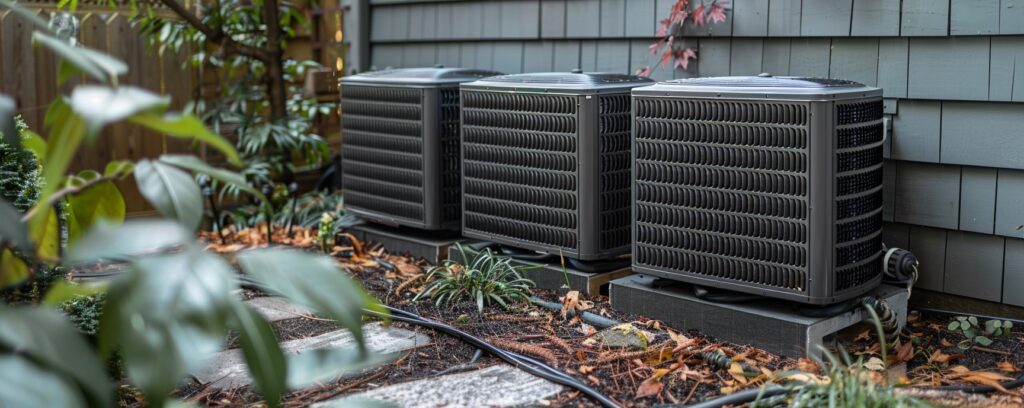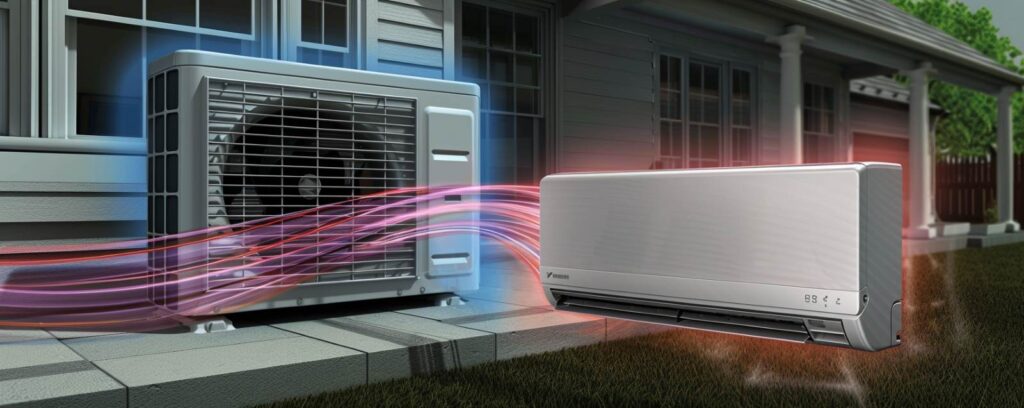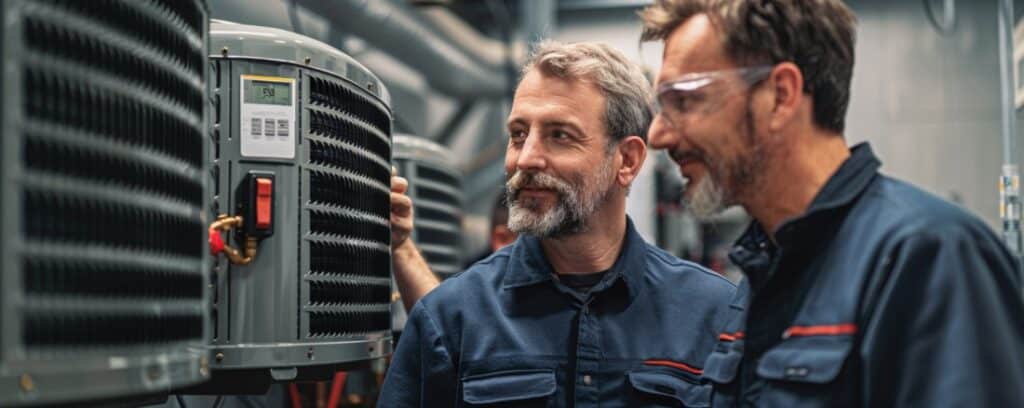When considering a career in the heating, ventilation, and air conditioning (HVAC) industry, it’s important to understand the distinction between HVAC and HVACR. Both fields play a crucial role in maintaining indoor climate control and air quality, but they encompass slightly different areas of expertise.
The demand for skilled professionals in both HVAC and HVACR is growing, driven by advancements in technology and an increasing emphasis on energy efficiency. This article will explore the differences between HVAC and HVACR, the educational paths for aspiring professionals, typical curricula, career opportunities, and the job outlook and salary expectations for these roles.
What Is HVACR?
HVACR stands for Heating, Ventilation, Air Conditioning, and Refrigeration. While HVAC focuses on controlling the temperature and air quality in buildings, HVACR adds the critical component of refrigeration. This expansion allows HVACR professionals to work on systems that not only provide heating and cooling but also refrigeration for preserving food, medicines, and other perishable items.
Refrigeration is a vital component in many industries, including food storage, pharmaceuticals, and industrial applications. It involves removing heat from a space or substance to lower its temperature, which is essential for preserving the quality and safety of perishable goods. By including refrigeration, HVACR professionals have a broader range of skills and knowledge, making them more versatile and valuable in the job market.
Differences Between HVAC and HVACR
Scope of Work
The primary difference between HVAC and HVACR is the inclusion of refrigeration. HVAC professionals focus on systems that control temperature and air quality, such as heating units, air conditioners, and ventilation systems. Their work ensures that indoor environments are comfortable and healthy.
HVACR professionals, on the other hand, have the additional responsibility of working with refrigeration systems. This includes installing, maintaining, and repairing refrigeration units used in various settings, from residential refrigerators to large-scale industrial freezers. The inclusion of refrigeration requires specialized knowledge of refrigeration cycles, refrigerants, and the specific regulations governing their use.
Skills and Training
Both HVAC and HVACR professionals need a solid understanding of thermodynamics, fluid mechanics, and electrical systems. However, HVACR technicians require additional training in refrigeration principles and practices. This includes learning about different types of refrigerants, the refrigeration cycle, and the proper handling and disposal of refrigerants to comply with environmental regulations.
Educational programs for HVACR typically offer more comprehensive training compared to HVAC programs, covering a broader range of systems and technologies. This additional training can make HVACR professionals more adaptable and capable of handling a wider variety of tasks in their careers.
Job Opportunities
The expanded skill set of HVACR professionals opens up more job opportunities compared to those focused solely on HVAC. In addition to roles in heating, ventilation, and air conditioning, HVACR technicians can work in industries that require refrigeration expertise, such as food processing, pharmaceuticals, and manufacturing. This versatility can lead to better job security and potentially higher salaries.
In summary, while HVAC focuses on maintaining comfortable indoor environments through heating, ventilation, and air conditioning, HVACR includes the critical component of refrigeration, broadening the scope of work and increasing job opportunities. Understanding these differences is essential for anyone considering a career in this field.
How to Pursue a Career in HVAC and HVACR
Vocational Schools and Technical Colleges
Vocational schools and technical colleges offer focused training programs that prepare students for careers in HVAC and HVACR. These programs typically range from six months to two years and provide both classroom instruction and hands-on experience. Courses cover fundamental topics such as:
- Thermodynamics and Fluid Mechanics: Understanding the principles of heat transfer and fluid flow is crucial for designing and maintaining HVACR systems.
- Electrical Systems: Students learn about electrical circuits, wiring, and controls, which are essential for installing and troubleshooting HVACR equipment.
- Refrigeration: Specialized courses in refrigeration teach students about refrigeration cycles, types of refrigerants, and safe handling practices.
Graduates of these programs receive a diploma or certificate, making them eligible for entry-level positions in the HVACR industry. Vocational schools and technical colleges often have partnerships with local businesses, providing students with internship opportunities and potential job placements upon graduation.
Community Colleges and Universities
Community colleges and universities offer more advanced training through associate and bachelor’s degree programs in HVACR technology or related fields. These programs typically take two to four years to complete and provide a more in-depth education, including general education courses that enhance critical thinking and communication skills.
- Associate Degree Programs: These two-year programs provide a comprehensive education in HVACR, covering advanced topics such as system design, energy management, and building automation. Students also gain hands-on experience through lab work and internships.
- Bachelor’s Degree Programs: A four-year bachelor’s degree program offers even more extensive training, often including courses in business management, project management, and sustainability. This level of education prepares graduates for supervisory or management roles within the industry.
Certifications and Licensing
Obtaining certifications and licenses is crucial for advancing in the HVACR field. Several certifications are highly regarded in the industry:
- EPA Section 608 Certification: This certification is mandatory for technicians who handle refrigerants. The Environmental Protection Agency (EPA) offers four types of certification, each covering different types of equipment.
- North American Technician Excellence (NATE) Certification: NATE is a nationally recognized certification that validates a technician’s knowledge and skills in HVACR. It offers various certification exams tailored to different specialties within the field.
- HVAC Excellence Certification: This certification program provides various levels of certification for HVACR technicians, from entry-level to master specialist.
In addition to these certifications, some states require HVACR technicians to be licensed. Licensing requirements vary by state but typically involve passing an exam and completing a certain number of hours of work experience.
Training for Current Workers
For current workers in the maintenance or related fields looking to transition into HVACR or enhance their skills, there are several training options available. Many vocational schools and community colleges offer part-time or evening classes to accommodate working professionals. Online courses and certification programs provide flexible learning opportunities that allow individuals to gain new skills and credentials without disrupting their current employment.
By pursuing the appropriate educational path and obtaining relevant certifications, aspiring HVACR professionals can equip themselves with the knowledge and skills needed to succeed in this growing field. Whether starting from scratch or seeking to advance an existing career, there are numerous opportunities for training and development in HVACR.
What You Will Learn in HVACR Programs
Core Subjects and Training
HVACR training programs cover a broad range of topics to ensure that students acquire the necessary skills to excel in the industry. These core subjects include:
Thermodynamics and Fluid Mechanics
Understanding the principles of thermodynamics and fluid mechanics is essential for HVACR professionals. These courses teach students about heat transfer, energy conservation, and the behavior of fluids in various systems. This knowledge is fundamental for designing and maintaining efficient heating, cooling, and refrigeration systems.
Electrical Systems
Courses on electrical systems cover the basics of electrical circuits, wiring, and controls. Students learn how to read and interpret electrical diagrams, install electrical components, and troubleshoot electrical issues in HVACR systems. Knowledge of electrical systems is crucial for ensuring that all HVACR equipment operates safely and efficiently.
Refrigeration
Refrigeration courses focus on the principles and practices of refrigeration, including the refrigeration cycle, types of refrigerants, and the safe handling and disposal of these substances. Students learn to install, maintain, and repair refrigeration units, which are essential for preserving food, medicines, and other perishable items. Understanding refrigeration is a key differentiator for HVACR professionals.
HVAC System Design
Design courses teach students how to calculate heating and cooling loads, select appropriate equipment, and design ductwork and piping systems. These skills are critical for creating efficient and effective HVACR systems that meet the specific needs of various buildings and applications. Students also learn about building codes and standards that must be adhered to in system design.
Safety Protocols
Safety is a paramount concern in the HVACR industry. Safety courses educate students on the proper use of personal protective equipment (PPE), safe handling of tools and materials, and emergency response procedures. Understanding and adhering to safety protocols helps prevent accidents and ensures a safe working environment.
Hands-On Experience
Practical training is an integral part of HVACR programs. Students spend significant time in labs and workshops, where they apply theoretical knowledge to real-world scenarios. This hands-on experience is crucial for developing the technical skills and confidence needed to perform maintenance and repair tasks effectively.
- Lab Work: Students work with actual HVACR equipment, performing tasks such as installing and servicing heating and cooling systems, troubleshooting electrical circuits, and handling refrigerants.
- Internships: Many programs include internships or cooperative education opportunities, allowing students to gain real-world experience while completing their studies. Internships provide exposure to the day-to-day operations of HVACR professionals and often lead to job offers upon graduation.
Advanced Topics
For those pursuing advanced degrees or certifications, HVACR programs may offer courses in specialized areas such as:
- Building Automation Systems: Training in the integration and management of building automation systems that control HVACR equipment and other building systems.
- Energy Management: Courses on energy efficiency, sustainable practices, and the implementation of energy-saving technologies in HVACR systems.
- Advanced Refrigeration Technologies: In-depth study of cutting-edge refrigeration technologies and their applications in various industries.
By completing a comprehensive curriculum that includes these core subjects and practical experiences, students are well-prepared for careers as HVACR professionals. They gain the knowledge and skills needed to design, install, maintain, and repair a wide range of HVACR systems, ensuring that buildings remain comfortable, efficient, and safe.
Career Opportunities for HVAC and HVACR Technicians
Different Job Titles
Trained professionals in the HVAC and HVACR fields have a wide range of career opportunities available to them. Here are some of the common job titles and roles they might pursue:
Residential and Commercial HVAC Technicians
HVAC technicians work on installing, maintaining, and repairing heating, ventilation, and air conditioning systems in homes and businesses. They ensure that HVAC systems operate efficiently and provide comfort to building occupants. This role often includes:
- Installation: Setting up new HVAC systems, including ductwork, electrical connections, and controls.
- Maintenance: Performing routine maintenance tasks such as changing filters, cleaning coils, and checking system performance.
- Repair: Diagnosing and repairing system malfunctions, which may involve replacing parts, fixing electrical issues, and recharging refrigerants.
Industrial Refrigeration Technicians
Industrial refrigeration technicians specialize in large-scale refrigeration systems used in industries such as food processing, pharmaceuticals, and manufacturing. Their responsibilities include:
- System Design and Installation: Designing and installing refrigeration systems that meet the specific needs of industrial clients.
- Maintenance and Repair: Performing regular maintenance and repairs to ensure that refrigeration systems operate efficiently and reliably.
- Compliance: Ensuring that all systems comply with industry regulations and safety standards.
Facility Maintenance Technicians
Facility maintenance technicians are responsible for maintaining all building systems, including HVAC, electrical, plumbing, and general building upkeep. Their duties include:
- Routine Inspections: Conducting regular inspections of building systems to identify and address potential issues.
- Repairs: Performing necessary repairs to keep all systems operational and ensure the safety and comfort of building occupants.
- Upgrades and Improvements: Implementing upgrades and improvements to enhance system performance and energy efficiency.
Specialized HVACR Roles
In addition to general HVACR roles, there are opportunities for specialization in specific areas. These specialized roles can lead to higher salaries and more advanced career opportunities:
- HVACR System Designers: Professionals who focus on designing HVACR systems for new buildings or retrofitting existing structures. They use advanced software tools to create efficient and effective system layouts.
- Energy Management Consultants: Experts in energy efficiency who advise clients on how to reduce energy consumption and improve the sustainability of their HVACR systems.
- HVACR Sales Engineers: Sales professionals with technical knowledge who help clients select the right HVACR systems for their needs and provide ongoing support and service.
Job Outlook and Salary for HVACR Professionals
The job outlook for HVACR professionals is very promising. According to the U.S. Bureau of Labor Statistics (BLS), employment for heating, air conditioning, and refrigeration mechanics and installers is projected to grow 6% from 2022 to 2032, which is faster than the average for all occupations. This growth is driven by the increasing demand for energy-efficient systems, the need to replace older HVACR systems, and the growing focus on indoor air quality.
As of May 2023, the median annual wage for HVACR technicians was $57,300. The salary can vary significantly based on factors such as experience, location, and specialization. The BLS reports that the highest 10 percent earned more than $84,000.
Career Satisfaction and Advancement
Beyond salary, many HVACR professionals report high levels of job satisfaction. The variety of tasks, the opportunity to solve complex problems, and the critical role they play in maintaining comfortable and safe environments contribute to the fulfillment many technicians find in their careers. The field offers numerous opportunities for career advancement, including moving into supervisory or management roles, specializing in areas such as HVACR system design, energy management, or sales engineering, or pursuing further education and certifications to enhance skills and qualifications.
Future Trends
The HVACR industry is continuously evolving with advancements in technology, such as smart HVAC systems, renewable energy integration, and improved building automation. Staying current with these trends through continuous education and professional development is crucial for those looking to advance their careers and maximize their earning potential.
Frequently Asked Questions
What is the difference between HVAC and HVACR?
The primary difference between HVAC and HVACR lies in the scope of work. HVAC stands for Heating, Ventilation, and Air Conditioning, focusing on systems that control the temperature and air quality within buildings. HVACR includes an additional component: Refrigeration. This means HVACR professionals also work with systems designed to keep items such as food and medicines at cold temperatures. HVACR technicians require specialized knowledge in refrigeration principles, making them more versatile and capable of handling a broader range of tasks than HVAC-only technicians.
How long does it take to complete HVACR training?
The duration of HVACR training depends on the educational path chosen:
- Vocational School or Technical College: Certificate and diploma programs typically take six months to two years to complete.
- Associate Degree: An associate degree in HVACR technology usually takes about two years.
- Bachelor’s Degree: A bachelor’s degree in HVACR or a related field generally takes four years.
- Certifications and On-the-Job Training: Additional certifications and on-the-job training can take a few months to a year, depending on the program and level of expertise required.
Overall, becoming fully trained in HVACR can take anywhere from six months to four years or more, depending on the depth of training and education pursued.
Are there online HVACR training programs available?
Yes, there are online HVACR training programs available, offering flexibility for students who need to balance their studies with work or other commitments. These programs typically include online coursework combined with hands-on lab work, which can be completed locally. Some reputable institutions offer online HVACR programs that cover the same core subjects as traditional in-person programs, including thermodynamics, electrical systems, and refrigeration. However, it’s important to ensure that any online program is accredited and provides adequate practical training opportunities.
What certifications are required for HVACR technicians?
Several certifications are essential and beneficial for HVACR technicians:
- EPA Section 608 Certification: Mandatory for handling refrigerants. Technicians must pass an exam covering different types of equipment.
- NATE Certification: North American Technician Excellence (NATE) certification validates a technician’s knowledge and skills in HVACR. It offers various certification exams tailored to different specialties within the field.
- HVAC Excellence Certification: Provides various levels of certification for HVACR technicians, from entry-level to master specialist.
- OSHA Certification: Certification in Occupational Safety and Health Administration (OSHA) standards, which is crucial for maintaining workplace safety.
- Specialized Certifications: Certifications for specific areas such as energy management, green technologies, and advanced refrigeration systems can enhance career prospects.
What are the career advancement opportunities in HVACR?
Career advancement opportunities in HVACR are plentiful and can lead to higher-paying and more specialized roles:
- Maintenance Supervisor: Overseeing a team of technicians and ensuring the completion of maintenance tasks efficiently.
- Facility Manager: Managing the entire maintenance operation of a building or group of buildings, including planning maintenance schedules and managing budgets.
- Specialized Technician: Focusing on specific areas such as HVACR system design, energy management, or advanced refrigeration technologies.
- HVACR Sales Engineer: Combining technical knowledge with sales skills to help clients select the right systems and provide ongoing support.
- Consultant Roles: Advising on energy efficiency, sustainability practices, and advanced system designs.
Advancing in HVACR often involves gaining additional certifications, continuing education, and accumulating practical experience in the field.
Charting Your Path in HVACR
Pursuing a career in HVACR offers numerous opportunities for professional growth, job security, and financial stability. With the increasing demand for energy-efficient systems and the growing focus on sustainable building practices, skilled HVACR technicians are more essential than ever. Understanding the differences between HVAC and HVACR, the educational paths available, and the career opportunities can help you make informed decisions about your future.
Whether you are just starting out or looking to advance your career, HVACR provides a variety of roles that cater to different interests and skill sets. Continuous learning, obtaining relevant certifications, and staying updated with industry trends will ensure your success in this dynamic field. Embrace the opportunities, invest in your education, and build a rewarding career as an HVACR professional.




